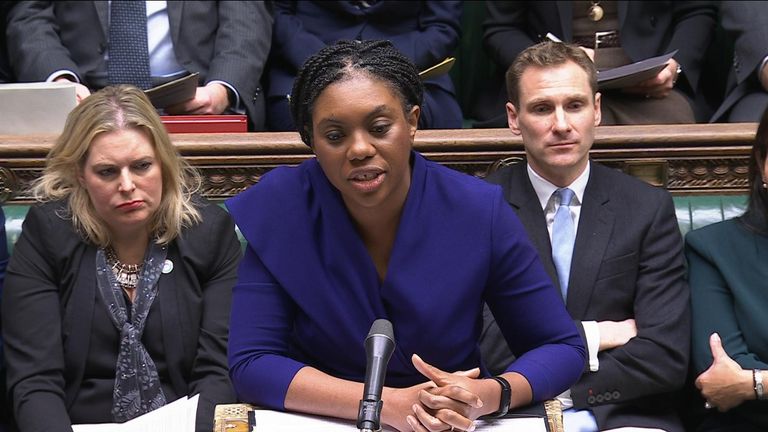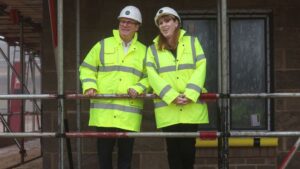The Tories’ attempts to force a grooming gang inquiry won’t result in a probe – here’s why
The Conservatives are one of the groups calling for an inquiry into grooming gangs – and are proposing a plan to do so in the Commons – but even if it passes, a statutory inquiry will not be launched.

The Conservatives’ attempts to force MPs to vote for a statutory inquiry into child sex gangs would not lead to an inquiry, even if it’s supported in the Commons.
As part of the ongoing debate on the topic, Tory leader Kemi Badenoch has said her party plans to table an amendment on Wednesday to the Children’s Wellbeing Bill to require a statutory inquiry into grooming gangs.
Writing on X, Ms Badenoch said she hoped “MPs from all parties” would support the inquiry.
Passing the amendment, however, would not force the government to launch such an inquiry necessarily – and would instead kill the legislation.
Politics Live: No 10 gives no timetable for abuse report
Here’s why…
What is the point of the amendment?
First off, it’s important to note that the primary purpose of moves like this is the politics, rather than the procedure.
By forcing a vote on an amendment – with Labour opposing it – the Conservatives will be able to point to Labour and say they voted against an inquiry.
Labour’s massive majority means the Tories have an almost zero chance of winning – and this kind of move is made by all oppositions.
Conservative strategists will also hope it foments unrest on the Labour benches if there are MPs unhappy with Downing Street’s or Sir Keir Starmer’s response to the issue.
Read more:
Failure to report child sex abuse to become criminal offence
Starmer addresses calls for an inquiry
Analysis: How should politicians handle Elon Musk
Why would supporting the amendment not cause an inquiry?
It is at this point we get into the weeds of parliamentary procedure.
When a bill is proposed in the Commons, it passes through several stages. First it is introduced to the House – and there is no debate at this point.
Then there is a “second reading”, where MPs debate the bill for the first time and vote on whether it should proceed.
It is after this point that MPs take the bill away into a committee and go through line by line and propose and consider amendments. Further votes follow, as well as stages in the Lords before it becomes law.
The Children’s Wellbeing Bill is set to have its second reading on Wednesday.
As was mentioned above – amendments do not normally take place until after this stage.
By proposing an amendment at the second reading, the Conservatives have to use what is known as a “reasoned amendment”.
If this passes, instead of changing the proposed bill for future votes, it kills it off and no further stages take place.
Furthermore, this would stop the government reintroducing the Children’s Wellbeing Bill again until after the next King’s Speech.
The purpose of Children’s Wellbeing Bill is to reform things like the children’s care system and protecting children in schools.

Will a vote take place?
Whether a vote takes place is up to the Speaker of the House of Commons.
It is impossible to know if he will choose the amendment – however, amendments in the name of the leader of the Opposition and supported by the shadow cabinet do tend to get selected so they can be debated.
However, a “reasoned amendment” has to be formulated in a specific way – notably, it needs to give a specific reason for the opposition to the bill.
Erksine May – the rulebook for the House of Commons – says the usual way is to use a form of words like “this House declines to give a second reading to a bill which …”, or “to the … Bill because …”.
This is instead of just voting against the bill in general, something achieved through the normal vote.
The last time such a bill was successful in killing legislation was in 1986.
Margaret Thatcher’s attempts to reform Sunday trading legislation were halted at that time by a Labour Party led by Neil Kinnock.
However, proceedings were a bit confused. The Speaker initially refused to allow MPs to vote on Mr Kinnock’s amendment – and then changed his mind halfway through the debate.
With a significant number of Tory rebels, Mrs Thatcher was defeated following a late night vote.
What are the parties saying?
Since Ms Badenoch’s announcement on Monday, the Conservatives have doubled down on their position.
A spokesperson for the party said: “Labour are looking for any excuse to get out of holding a much-needed national inquiry into child rape grooming gangs.
“Labour’s attempts to hide behind parliamentary procedure and take the debate away from victims will not save them from their moral cowardice, and their failure to give victims the answers they deserve.
“Labour MPs now have the chance to do the right thing, and vote for justice.”
Be the first to get Breaking News
Install the Sky News app for free


👉 Listen to Politics At Jack And Sam’s on your podcast app👈
Labour, meanwhile, says previous inquiries have carried out the work necessary to look into grooming gangs.
It says it plans to implement all the recommendations from the Jay review, and will announce more details in the Crime and Policing Bill at a point later this year.


